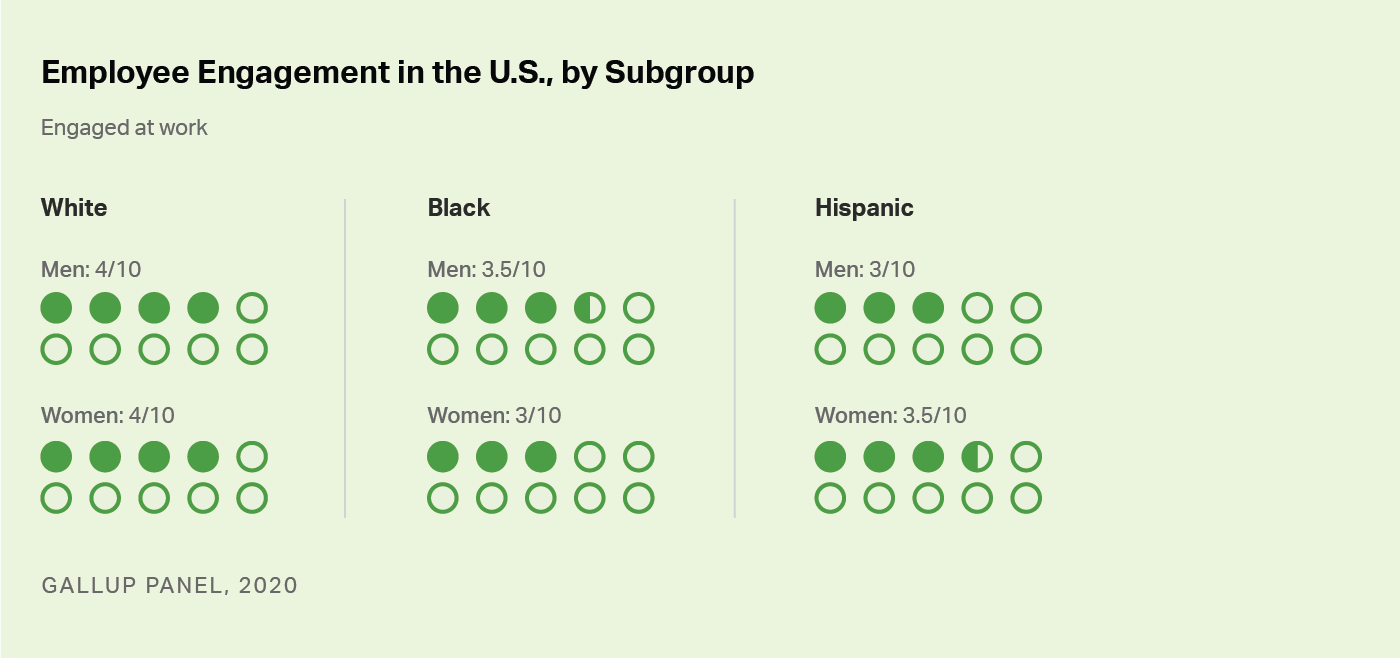Story Highlights
- Black women have a unique experience in the workplace
- Black women are the least likely to feel valued and treated with respect
- Employee engagement and inclusion can be nurtured by managers
The experience of Black women at work differs from that of other Americans, even that of Black men and White women. Understanding Black women's double minority status at work is a necessary part of building inclusive and equitable workplaces.
A survey conducted by the Gallup Center on Black Voices between Nov. 6 and Dec. 1, 2020, found that Black women are less likely to feel they are treated with respect in the workplace. They are also less likely to feel like a valued member of their team and that their coworkers treat everyone fairly.
| White men | White women | Black men | Black women | Hispanic men | Hispanic women | ||||||||||||||||||||||||||||||||||||||||||||||||||||||||||||||||||||||||||||||||||||||||||||||
|---|---|---|---|---|---|---|---|---|---|---|---|---|---|---|---|---|---|---|---|---|---|---|---|---|---|---|---|---|---|---|---|---|---|---|---|---|---|---|---|---|---|---|---|---|---|---|---|---|---|---|---|---|---|---|---|---|---|---|---|---|---|---|---|---|---|---|---|---|---|---|---|---|---|---|---|---|---|---|---|---|---|---|---|---|---|---|---|---|---|---|---|---|---|---|---|---|---|---|---|
| % | % | % | % | % | % | ||||||||||||||||||||||||||||||||||||||||||||||||||||||||||||||||||||||||||||||||||||||||||||||
| I feel like a valued member of my team. | 42 | 38 | 36 | 33 | 35 | 36 | |||||||||||||||||||||||||||||||||||||||||||||||||||||||||||||||||||||||||||||||||||||||||||||
| At work, I am treated with respect. | 42 | 39 | 46 | 36 | 39 | 40 | |||||||||||||||||||||||||||||||||||||||||||||||||||||||||||||||||||||||||||||||||||||||||||||
| My coworkers treat everyone fairly at work. | 34 | 29 | 32 | 26 | 30 | 32 | |||||||||||||||||||||||||||||||||||||||||||||||||||||||||||||||||||||||||||||||||||||||||||||
| Among U.S. workers | |||||||||||||||||||||||||||||||||||||||||||||||||||||||||||||||||||||||||||||||||||||||||||||||||||
| Gallup Panel, 2020 | |||||||||||||||||||||||||||||||||||||||||||||||||||||||||||||||||||||||||||||||||||||||||||||||||||
This could be related to role. Black women -- about 60% of whom are employed, according to the U.S. Bureau of Labor Statistics -- are disproportionately represented in lower-wage jobs like food service and healthcare assistance, and they are more likely than any other racial/ethnic group to have a full-time minimum-wage job.
The Gallup Center on Black Voices finds that only 13% of Black women strongly agree they have access to good jobs in their community, and just over a third say they're living comfortably on their present income.
| White men | White women | Black men | Black women | Hispanic men | Hispanic women | ||||||||||||||||||||||||||||||||||||||||||||||||||||||||||||||||||||||||||||||||||||||||||||||
|---|---|---|---|---|---|---|---|---|---|---|---|---|---|---|---|---|---|---|---|---|---|---|---|---|---|---|---|---|---|---|---|---|---|---|---|---|---|---|---|---|---|---|---|---|---|---|---|---|---|---|---|---|---|---|---|---|---|---|---|---|---|---|---|---|---|---|---|---|---|---|---|---|---|---|---|---|---|---|---|---|---|---|---|---|---|---|---|---|---|---|---|---|---|---|---|---|---|---|---|
| % | % | % | % | % | % | ||||||||||||||||||||||||||||||||||||||||||||||||||||||||||||||||||||||||||||||||||||||||||||||
| There are plenty of opportunities to get good jobs in my community. (% Strongly agree) | 22 | 16 | 19 | 13 | 22 | 18 | |||||||||||||||||||||||||||||||||||||||||||||||||||||||||||||||||||||||||||||||||||||||||||||
| I am living comfortably on my present income. | 57 | 46 | 44 | 37 | 40 | 39 | |||||||||||||||||||||||||||||||||||||||||||||||||||||||||||||||||||||||||||||||||||||||||||||
| Among U.S. workers | |||||||||||||||||||||||||||||||||||||||||||||||||||||||||||||||||||||||||||||||||||||||||||||||||||
| Gallup Panel, 2020 | |||||||||||||||||||||||||||||||||||||||||||||||||||||||||||||||||||||||||||||||||||||||||||||||||||
The study is representative of all Black women in all job categories in every pay level, yet we find similar challenges throughout the workforce.
| White men | White women | Black men | Black women | Hispanic men | Hispanic women | ||||||||||||||||||||||||||||||||||||||||||||||||||||||||||||||||||||||||||||||||||||||||||||||
|---|---|---|---|---|---|---|---|---|---|---|---|---|---|---|---|---|---|---|---|---|---|---|---|---|---|---|---|---|---|---|---|---|---|---|---|---|---|---|---|---|---|---|---|---|---|---|---|---|---|---|---|---|---|---|---|---|---|---|---|---|---|---|---|---|---|---|---|---|---|---|---|---|---|---|---|---|---|---|---|---|---|---|---|---|---|---|---|---|---|---|---|---|---|---|---|---|---|---|---|
| % | % | % | % | % | % | ||||||||||||||||||||||||||||||||||||||||||||||||||||||||||||||||||||||||||||||||||||||||||||||
| My organization is fair to everyone. | 31 | 27 | 27 | 23 | 30 | 26 | |||||||||||||||||||||||||||||||||||||||||||||||||||||||||||||||||||||||||||||||||||||||||||||
| I have the same opportunities for advancement as everyone else. | 38 | 33 | 30 | 27 | 33 | 29 | |||||||||||||||||||||||||||||||||||||||||||||||||||||||||||||||||||||||||||||||||||||||||||||
| If I raised a concern about ethics and integrity, I am confident my employer would do what is right. | 37 | 36 | 33 | 31 | 32 | 33 | |||||||||||||||||||||||||||||||||||||||||||||||||||||||||||||||||||||||||||||||||||||||||||||
| Among U.S. workers | |||||||||||||||||||||||||||||||||||||||||||||||||||||||||||||||||||||||||||||||||||||||||||||||||||
| Gallup Panel, 2020 | |||||||||||||||||||||||||||||||||||||||||||||||||||||||||||||||||||||||||||||||||||||||||||||||||||
Impact of Engagement and Inclusion
Disparities in workplace experiences represent real, and potentially significant, differences in the way workers approach their jobs. Positive or negative, these experiences form an individual's ability to trust others and to build more productive and effective teams.
For employees, feeling like a valued member of the team and believing that their supervisor promotes a "trusting and open environment" creates inclusion. Workers who feel they are included and belong are quicker to offer their opinions than those who don't. This goes a long way in explaining the superior business results that come with diversity in the workplace.
Elements of engagement -- employees' belief that their opinions count and that their coworkers are committed to quality work, for example -- are also important drivers of productivity and performance. Engaged employees are emotionally connected to their workplace, which leads to better workplace outcomes.
Inclusion and engagement have a bottom-line value to businesses and a personal value to individuals -- in fact, engagement and wellbeing have a reciprocal relationship.
For employees, feeling like a valued member of the team and believing that their supervisor promotes a "trusting and open environment" creates inclusion.
Black employees' wellbeing and engagement levels are lower than those of White employees -- but the differences are not insurmountable. They are fixable.

In the U.S. 4 in 10 White men are engaged at work, 4 in 10 White women are engaged, 3.5 in 10 Black men are engaged, 3 in 10 Black women are engaged, 3 in 10 Hispanic men are engaged and 3.5 in 10 Hispanic women are engaged.
Even the largest difference we found in wellbeing and engagement across racial/ethnic groups -- 11 percentage points between Black women and White men, who typically report the most positive experiences across all measures -- can be resolved through engagement and inclusion. Both of these pieces are part of the employee experience that can be nurtured by managers.
| White men | White women | Black men | Black women | Hispanic men | Hispanic women | ||||||||||||||||||||||||||||||||||||||||||||||||||||||||||||||||||||||||||||||||||||||||||||||
|---|---|---|---|---|---|---|---|---|---|---|---|---|---|---|---|---|---|---|---|---|---|---|---|---|---|---|---|---|---|---|---|---|---|---|---|---|---|---|---|---|---|---|---|---|---|---|---|---|---|---|---|---|---|---|---|---|---|---|---|---|---|---|---|---|---|---|---|---|---|---|---|---|---|---|---|---|---|---|---|---|---|---|---|---|---|---|---|---|---|---|---|---|---|---|---|---|---|---|---|
| % | % | % | % | % | % | ||||||||||||||||||||||||||||||||||||||||||||||||||||||||||||||||||||||||||||||||||||||||||||||
| % Thriving | 58 | 53 | 50 | 47 | 50 | 50 | |||||||||||||||||||||||||||||||||||||||||||||||||||||||||||||||||||||||||||||||||||||||||||||
| Among U.S. workers | |||||||||||||||||||||||||||||||||||||||||||||||||||||||||||||||||||||||||||||||||||||||||||||||||||
| Gallup Panel, 2020 | |||||||||||||||||||||||||||||||||||||||||||||||||||||||||||||||||||||||||||||||||||||||||||||||||||
The Source of Engagement in Any Company: The Manager
Managers are responsible for 70% of the variance in team engagement scores. And Gallup has found that the most effective way to engage workers is to coach them.
Managers who coach are better able to form real relationships with workers that leverage their strengths, which leads to superior business outcomes. But those relationships also help managers create conditions of inclusion and engagement -- the conditions Black women are less likely to experience than their coworkers.
Coaches accomplish that by:
Individualizing: No two employees are the same. Gallup data show that the experience of Black women cannot be reduced to their race/ethnicity or their gender, so knowing them as individuals and understanding their background and experiences can help managers create conditions that enable success.
Focusing on strengths: There is no better way to accelerate the performance and aspirations of an employee than by empowering them to do more of what they naturally do best.
Meeting engagement needs: Fulfilling each element of engagement fulfills real human needs, which can dramatically change the experience of work. Discussing how each employee experiences the 12 elements of engagement gives managers critical insights into their employees' personal motivations and how best to inspire them. Black women are among the least likely to be engaged.
Measuring the elements of inclusion: Inclusion creates a sense of psychological safety for employees, and safety allows them the confidence to bring their best to work every day. Inclusion-oriented pulse surveys can identify areas where psychological safety is weak and is creating barriers to exceptional performance.
Communicating cultural values: Managers can embed leaders' defined values about diversity and inclusion in their teams' day-to-day work. Values can easily dissolve into empty promises if managers don't bring them to life; employees need to see managers "walk the talk" every day.
Coaches create inclusion and engagement through their day-to-day behaviors. Managers may need development to better understand how their behaviors affect individual engagement.
The good news is that workplaces that take decisive action and train their managers to become coaches can quickly effect positive change for Black women. They're the demographic likeliest to strongly agree that they know what's expected of them at work -- which is fundamental to engagement and is a solid foundation for a successful coaching relationship. Such relationships welcome meaningful conversations, which may well be the key to a different, more engaging employee experience for Black women.
Creating inclusive environments that get the best from each employee is the goal. Black women are less likely to work in one of those environments, but they could. They should -- all workers should. It is not only better for them, but better for business too.
Learn more about the Gallup Center on Black Voices Jobs and Work series:
- Read our findings on discrimination and representation for Black workers, learn about managers' preparedness to have conversations about race and equality, and see upcoming topics.
- Subscribe to receive updates and new insights from the Gallup Center on Black Voices.
- Register for our on-demand webinar, Race in the Workplace: Navigating Difficult Conversations and Leadership Decisions.
- Tune in to the Cultural Competence podcast.




